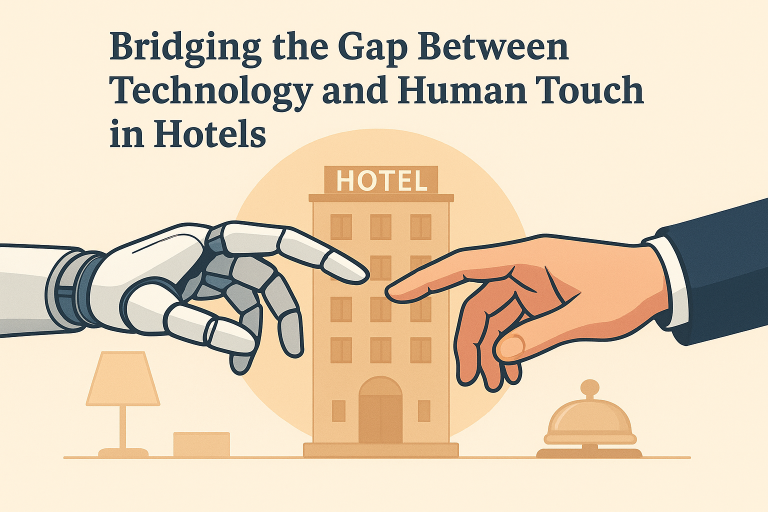Hotels are changing fast with new tech. Guests expect fast check-in, smart rooms, chatbots. Yet many still want warmth. They want smiles. They want people who care. The challenge for hoteliers is to mix technology and human care well.
In this blog we will explore how hotels can use technology without losing the human touch. We will see why both sides matter. We will also look at good examples, real challenges, and the path forward.
The Rise of Technology in Hotels
Contactless Check-Ins and Mobile Keys
Guests like using their phones to check in. No long queues. No waiting at the front desk. Mobile keys let guests open doors with phone apps and improve operations via tools like Hotel Operations software. This feels modern and gives control.
Smart Rooms and IoT
Rooms can now learn what guests like. Light, temperature, entertainment. Smart thermostats. Voice control. Devices that talk to each other. Hotels can make comfort more personal.
AI-Powered Service
Chatbots answer common questions. Virtual concierges suggest nearby restaurants or events. Predictive tools guess what guests need before they ask. Tech makes service faster and more efficient.
Why the Human Touch Still Matters
Emotional Connections
Guests remember kindness. A staff member smiled. A friendly greeting. Someone who listens. These human moments build trust. They make stays memorable.
Personalized Problem Solving
Not everything is standard. Sometimes rooms have issues. Sometimes guests have special needs. Human staff can adapt informed by training covered in Staff Training guides. They can show empathy. They can solve unusual problems.
Building Loyalty Through Care
Guests who feel cared for are more likely to return. They tell friends. They leave good reviews. Human touch builds loyalty.
Finding the Right Balance
When to Automate
Routine tasks are good for automation. Checking in. Room key issuance. Billing. Turning lights on/off. These do not need constant human oversight. Technology can handle them reliably.
When to Humanize
When guests have issues. When they need comfort. When culture matters. When feelings are involved. In these moments, people matter most. A human voice makes a difference.
Blended Approaches
The best hotels use both. Use tech to handle simple tasks. Use people where connection is needed. For example, give guests chatbots for general info but a real person for special requests. Use data tools but let staff act with care.
Benefits of Bridging Technology and Human Touch
Efficiency Without Losing Warmth
Technology can make operations faster. Less waiting. Fewer mistakes. But human interaction keeps warmth. Staff can add kindness. That turns good into great.
Personalization at Scale
Technology collects data. It learns guest preferences. Staff can use that data to craft unique experiences. For example, remembering a guest’s pillow choice. Or surprise with a small favorite snack. Tech enables personal touches without manual work every time.
Higher Guest Satisfaction
Guests like smooth experiences and emotional moments. Balancing both leads to better satisfaction. Better reviews. More repeat customers.
Real-World Examples
Hotels Using Smart Tech With Human Support
Some hotels let guests check in with mobile apps. Then the staff meet them with a smile. Rooms adjust temperature automatically. But the staff still hand off welcome notes or local tips. This blend makes guests feel cared for without friction.
Lessons From Over-Automation
Some hotels replaced all human interaction. Big screens, robots, no people. Guests found it cold. They missed human warmth. For many, tech without human backup feels impersonal.
Challenges Hotels Face
Staff Training
People need new skills. Not only technical skills but also soft skills. Guests still want empathy, clarity, and friendliness. Hotels must train staff to use tech and also to connect.
Data Privacy Concerns
Tech collects guest data. Preferences. Behavior. Hotels must protect data, using compliance best practices from Compliance Guide articles. Use strong encryption. Guests trust the hotel with private info. Breaking that trust hurts business.
Cost of Implementation
New systems cost money. Hardware, software, maintenance. Also cost to train people. Not all hotels can afford big investments. Hotels must plan carefully to see return on investment.
Integrating Advanced Tech: A Special Case
One exciting area is voice technology. Hotels can now use professional voice cloning to create AI voices that sound natural, friendly, and consistent across all guest touchpoints. Instead of robotic or generic tones, these AI voices can be customized to reflect a brand’s personality, warm and welcoming in a luxury resort, or energetic and upbeat in a lifestyle hotel.
Guests might hear them in a virtual concierge, room service announcements, or smart room controls. When done well, this technology makes automation feel more personal, giving guests the sense that they are interacting with a caring human voice even when it is powered by AI.
The Future of Hospitality Experience
Human-Centered Technology
New tools will be built to support human staff, not replace them. Design will focus on guest feelings. Tech will help, staff will connect.
Predictive and Proactive Service
Hotels will anticipate needs. Maybe your phone says you like soft pillows. Or you have allergies. Maybe tech learns these. Then the staff welcomes you with the right pillow. Or menu options. Proactive service feels special.
The Hotel of Tomorrow
Future hotels may have virtual reality previews. AI that listens and helps you without waiting. Technology that adjusts the environment before you ask. But always with people ready to care. Hotels that master the gap will lead the industry.
Conclusion
Technology is powerful. It brings efficiency, convenience, new possibilities. But it cannot replace the human heart in hospitality. The best hotels will bridge the gap. They use tech to serve, people to care.
If you are running or managing a hotel, think about where you are now. Where can tech help? Where must human touch remain? Balance is not easy. But it is worth it. Guests will feel it. Your hotel will stand out.
Hotels that get this right will build homes away from home. Remember hospitality is not only about what you do. It is how you make someone feel.


